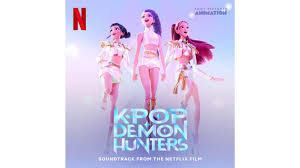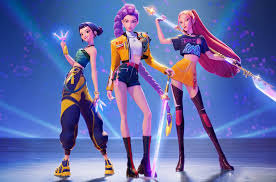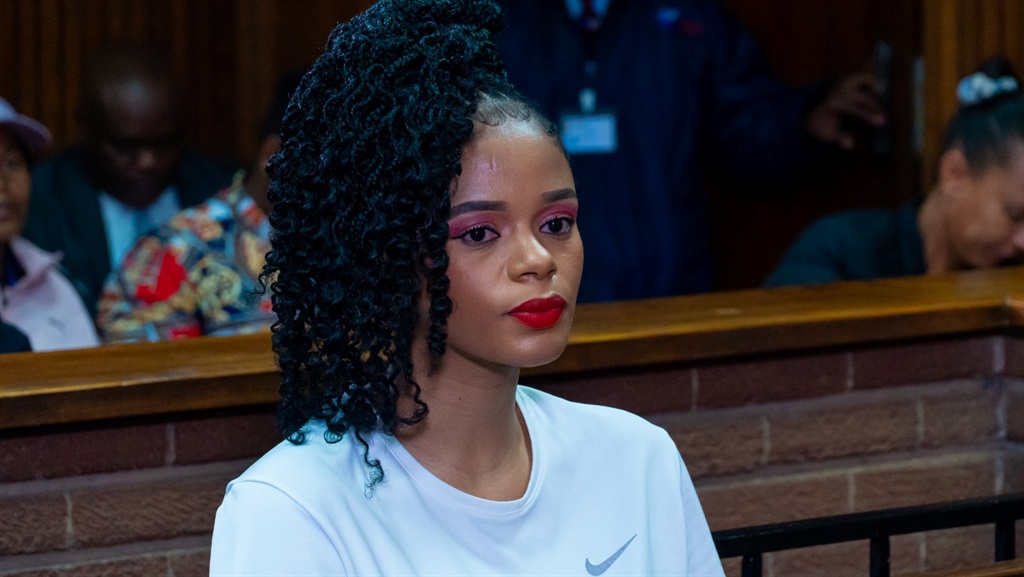K

Introduction
The year 2025 has ushered in a groundbreaking moment for both the music industry and the entertainment world. One of the most unexpected and spectacular achievements in recent memory has been the explosive rise of the soundtrack for the wildly popular animated series KPop Demon Hunters. The soundtrack, which blends the electrifying energy of K-pop with elements of fantasy and action, has not only captured the hearts of global audiences but has also dominated charts, broken streaming records, and generated widespread cultural conversations. How did KPop Demon Hunters achieve such unprecedented success? Let’s explore the phenomenon.
For more: https://africatrademonitor.com/
The Birth of KPop Demon Hunters: A Unique Blend of Genres
At the crossroads of fantasy, action, and the ever-growing global K-pop movement lies KPop Demon Hunters, a groundbreaking animated series that captivated the world with its unprecedented combination of musical prowess and supernatural storytelling. The show’s premise is simple yet thrilling: a group of extraordinary demon hunters, each equipped with a unique, K-pop-inspired musical ability, must battle dark and dangerous forces that threaten the stability of the world.
The series weaves a rich tapestry of action-packed sequences, magical landscapes, and heart-pounding music, with every episode featuring high-energy K-pop tracks that echo the epic battles between good and evil.
While the premise sounds deceptively straightforward, the journey to create KPop Demon Hunters was anything but easy. It was, in many ways, an audacious and ambitious risk taken by the production team to merge two seemingly disparate genres: the colorful, high-octane world of K-pop and the time-honored tradition of fantasy storytelling. The vision was clear: to create something fresh and exciting that would capture not just the hearts of K-pop fans, but also appeal to anime and fantasy enthusiasts, as well as casual viewers. This concept demanded an innovative approach in both narrative structure and musical composition.
The inception of KPop Demon Hunters started with a simple but bold question: “What if music could be more than just a soundtrack?” Rather than merely being an accompaniment to the visual elements of the show, the producers realized that music itself needed to be an integral part of the storyline. This concept had never truly been explored in such depth before, especially in the realm of animation and fantasy.
Thus, the core idea evolved into one that blended the superhuman abilities of the characters with the transformative power of music. In this world, the demon hunters’ powers would not only be linked to their strength, agility, and intellect, but also to the music they created. Their abilities would grow, change, and evolve in tandem with the songs they performed.
The decision to center the abilities of the characters around K-pop was both innovative and groundbreaking. The series had to reflect the global phenomenon that K-pop has become over the past decade, capturing its energy, vibrancy, and cultural significance.
The appeal of K-pop as a genre is undeniable. With its infectious hooks, catchy choruses, and meticulously choreographed performances, K-pop has long been an international force, transcending linguistic and cultural boundaries. But what made KPop Demon Hunters stand out was its ambitious melding of this musical style with the mythical and magical elements typically associated with fantasy series.
For the show’s creators, this fusion wasn’t simply about using K-pop as a backdrop for fantasy battles. It was about creating a story where K-pop music could act as a magical force—a conduit for powers that could both defend the world and take down the forces of darkness. The characters are not just singers or dancers; they are warriors who channel the energy of music into supernatural powers.
The very nature of K-pop, with its rapid beat drops, intense vocal runs, and vibrant performances, was seen as the perfect vehicle for these high-stakes battles. Each demon hunter’s musical talent is uniquely suited to their persona and abilities. For example, one character might specialize in producing soundwaves that can destroy enemies, while another may manipulate the rhythm of their music to control time itself.
In designing this unique world, the creators drew inspiration from both Eastern and Western influences. K-pop itself is a unique blend of genres, borrowing elements from hip-hop, R&B, EDM, and rock, while infusing its performances with meticulous choreography and a global appeal. Similarly, fantasy storytelling is often known for its epic world-building, involving complex magic systems and high-stakes conflicts.
The marriage of these two elements was not only a challenge but an exciting opportunity to explore new creative possibilities. For example, instead of traditional sword fighting or spell-casting, the battles in KPop Demon Hunters unfold through intense musical confrontations. The characters do not merely face demons with weapons; they unleash sonic waves, melodies, and harmonies that resonate with immense magical power.
In a world where K-pop idols are revered as modern-day superheroes by fans, it made perfect sense to infuse the narrative of KPop Demon Hunters with similar themes of power and heroism. However, the creators knew that simply capitalizing on K-pop’s popularity would not be enough. The show had to have a solid foundation in terms of its storytelling.
The characters needed depth, the plot needed substance, and the music needed to be more than just catchy hooks—it needed to carry emotional weight. The producers knew that in order to fully integrate K-pop into the show, the soundtrack itself had to become a key storytelling device. Each song needed to echo the emotions and struggles of the characters, helping the audience connect with them on a deeper level.
One of the most ambitious aspects of KPop Demon Hunters was the decision to make the soundtrack as integral to the series as the story itself. Rather than releasing a generic set of pop songs, the producers enlisted top-tier K-pop producers and musicians to craft an album that would reflect the emotional and narrative arcs of the characters.
The team behind the soundtrack understood that K-pop’s diverse range of genres—from powerful ballads to upbeat EDM anthems—offered an incredible opportunity to explore a wide spectrum of emotions, from deep melancholy to exultant triumph. Songs were not just made for battle scenes or victory montages; each track was intricately designed to accompany a key moment in the character’s journey, whether it was a moment of self-discovery, loss, or an intense battle with a supernatural foe.
To achieve this ambitious goal, the production team collaborated with a mix of K-pop idols, composers, and arrangers. The show’s soundtrack became an eclectic mixture of styles, with each episode featuring a song that captured the tone of the storyline.
From intense rap battles that punctuated key confrontations, to soothing ballads that explored moments of introspection and vulnerability, every musical composition played a role in enhancing the narrative. The involvement of top K-pop producers such as Teddy Park and Choi Kyu-sung ensured that the music would be top-tier, with a mix of electronic beats, orchestral arrangements, and traditional Korean instruments to add cultural authenticity.
A crucial part of the show’s concept was to ensure that each character’s musical identity matched their supernatural abilities. One character, Jin, for example, might have an ethereal, angelic voice that channels the power of light, while another, Taeyang, would wield an aggressive rap style that channels the energy of fire. This allowed the show to explore a wide range of musical genres, from pop and rap to rock and even classical orchestral arrangements, each track designed to perfectly reflect the essence of the character and the scene at hand.
The team also recognized the importance of making the soundtrack as compelling and dynamic as the show itself. It had to go beyond just being an accompaniment; it needed to tell its own story and have a lasting impact on listeners. The producers envisioned an album that could stand on its own, one that fans would play outside of the show, on their playlists, and at concerts. KPop Demon Hunters needed a soundtrack that not only served as the heartbeat of the series but also existed as a cultural force in its own right.
The combination of fantasy and K-pop music presented unique challenges, but it also opened up vast new creative possibilities. Through a meticulous balancing act of powerful storytelling and groundbreaking music production, KPop Demon Hunters was born. What began as a daring experiment in genre fusion quickly became a cultural sensation, pushing the boundaries of what anime, music, and K-pop could achieve together.

The Making of the Soundtrack: Star-Studded Collaborations
The KPop Demon Hunters soundtrack was not just another collection of songs slapped together to promote a show. It was a carefully curated masterpiece, featuring top-tier K-pop idols, producers, and composers. Several prominent names in the K-pop world were brought on board to collaborate, including legendary producers like Teddy Park and Choi Kyu-sung, alongside fan-favorite idols from groups like BTS, BLACKPINK, EXO, and Stray Kids.
In a first for K-pop, KPop Demon Hunters featured a unique collaboration between seasoned idol groups and up-and-coming solo artists, allowing for a diverse range of sounds from hip hop and R&B to EDM and rock. The result was a sonic experience that appealed to K-pop fans, anime enthusiasts, and newcomers alike.
Tracks like “Demon’s Song” (featuring a collaboration between Jisoo of BLACKPINK and Hyunjin of Stray Kids), “Under the Moon” (a haunting ballad by Jungkook of BTS), and the explosive “Hunter’s Battle Anthem” (a high-energy track by Kai from EXO) became instant hits. The range of musical genres within the soundtrack was a key factor in its success, as it resonated with a wide audience.
The fusion of visual storytelling and music was key in translating the show’s themes into the soundtrack. For example, the iconic battle scenes were paired with tracks that heightened the intensity of the action. The melodies often reflected the emotional undertones of the story, whether it was the vulnerability of the characters or the adrenaline-pumping fight sequences. The fusion of K-pop’s catchy hooks with an epic narrative gave each track an almost cinematic quality.
The Phenomenal Reception: From Chart-Topping Success to Global Recognition
The soundtrack’s release was a seismic event in the music world. Within weeks, KPop Demon Hunters became the number one album on global music charts, including the Billboard 200 in the United States, the UK Albums Chart, and the Gaon Chart in South Korea. In addition to dominating music charts, the tracks from the soundtrack regularly topped streaming platforms like Spotify and Apple Music, racking up millions of plays across the globe.
One of the standout accomplishments was how the album transcended the typical K-pop fanbase. The series itself was a blend of genres that resonated with anime fans, fantasy enthusiasts, and even casual viewers who may not have been initially invested in K-pop. This cross-genre appeal allowed the soundtrack to tap into a global audience that stretched beyond the traditional K-pop community.
The song “Hunter’s Battle Anthem” became the unofficial anthem of the show, with fans all over the world creating covers, dance videos, and fan art. The song’s infectious beats and high-energy production made it a social media sensation, with millions of TikTok videos using the track as their backdrop. Its popularity even extended into video game soundtracks, with “Hunter’s Battle Anthem” being used in various online multiplayer games as a backdrop for battle scenes.
In addition to commercial success, the album also earned critical acclaim. Music critics praised its seamless blending of diverse styles, from K-pop to electronic dance music (EDM) to rock, while also highlighting the depth of emotion conveyed through the lyrics. Many noted that the soundtrack felt like a cinematic experience, with each track telling its own story while remaining part of the larger narrative.

Cultural Impact: K-Pop’s Global Expansion
KPop Demon Hunters didn’t just impact the music industry—it played a significant role in the global expansion of K-pop itself. K-pop has been steadily growing in global popularity for over a decade, but KPop Demon Hunters became a cultural phenomenon that accelerated the genre’s reach even further.
This crossover success is symbolic of a broader trend within the entertainment industry, where pop culture phenomena are no longer confined to specific regions. The fusion of K-pop with anime and fantasy allowed it to reach new audiences in places like Latin America, Europe, and even the Middle East.
Fans from all over the world started to organize fan events, dance covers, and even cosplay inspired by the characters in KPop Demon Hunters. The show’s themes of unity, teamwork, and fighting against the odds resonated with a wide demographic. It wasn’t just a soundtrack—it was a cultural moment, and its success helped elevate K-pop’s presence in mainstream entertainment.
In South Korea, the show was hailed as a national treasure. Its influence permeated not only music but also fashion, beauty, and even technology. The influence of the show extended to fashion brands, which began releasing KPop Demon Hunters-inspired clothing lines and makeup collections that took inspiration from the show’s characters.
The Show’s Visuals and Music: A Perfect Pairing
One of the most captivating elements of KPop Demon Hunters is its flawless fusion of visuals and music. While many shows may use music as a background element, the KPop Demon Hunters soundtrack does far more than just complement the on-screen action—it is intricately woven into the very fabric of the series, elevating the narrative and giving life to the characters’ emotional journeys. This seamless integration of music and animation is one of the central reasons why the soundtrack has resonated so deeply with audiences around the world.
The show’s visual appeal plays a crucial role in its success. It is renowned for its innovative animation, which cleverly blends traditional 2D animation techniques with cutting-edge CGI. This hybrid approach results in a breathtaking visual experience that brings the world of KPop Demon Hunters to life in vibrant, dynamic ways.
The animation is both stunning and fluid, allowing the characters and their environments to feel larger-than-life, while maintaining the beauty of hand-drawn artistry. The battle scenes are nothing short of spectacular, with sweeping camera angles, fast-paced action, and highly detailed backdrops.
However, what makes these visuals truly stand out is how they are enhanced by the soundtrack. In many shows, music often serves as an afterthought, simply providing ambiance or atmosphere. In KPop Demon Hunters, though, the music is integral to the narrative structure. Every fight sequence, every emotional moment, and every turning point in the story is paired with a song that not only complements the visual intensity but also amplifies the emotional weight of the scenes. The characters’ struggles and victories are mirrored by the highs and lows of the music, creating a rich, multi-sensory experience.
The soundtrack doesn’t merely accompany the action; it elevates it, adding layers of meaning and intensity. When a character unleashes their full potential in the heat of battle, the music surges in tandem with the action, using dramatic crescendos, rhythmic pulses, and energetic beats that propel the viewer into the heart of the fight.
The way the music syncs with the choreography of the characters during combat scenes is nothing short of mesmerizing. The characters’ every move, whether it’s an intricate dance sequence or an elegant martial arts style, feels amplified by the beats of the music, creating a harmonious interplay between sound and motion. It’s a visual and auditory symphony that is unparalleled in its execution.
The decision to blend music so deeply into the action and storytelling wasn’t accidental—it was a carefully considered creative choice. In KPop Demon Hunters, each character’s musical ability is tied directly to their persona, powers, and even their character development. For example, the character Jin is a skilled hunter with the ability to manipulate sound waves, using her power to control rhythm and melody in ways that can damage her enemies or protect her allies.
This unique power is brought to life in the music of the show. In one pivotal scene, Jin unleashes a stunning attack, using the power of a fierce, bass-heavy beat that reverberates through the ground, shaking the very foundations of the battleground. The pounding rhythm mirrors her internal struggle, as she taps into the deep well of her emotional energy to confront a formidable enemy. Her music becomes an extension of herself, and it is precisely this connection between the character and the sound that makes the scene so emotionally powerful.
In this way, the soundtrack doesn’t just tell the story of the characters—it also helps to define them. Each character’s music acts as a sonic signature, reflecting their emotions, challenges, and growth throughout the series. KPop Demon Hunters presents an ensemble cast of demon hunters, each with distinct musical styles, ranging from powerful rap sequences and emotive ballads to sweeping orchestral movements and frenetic electronic beats.
The diverse range of musical genres represents the individuality of the characters, adding depth to their personalities and backstories. For instance, a character who is brimming with energy and confidence might be represented by fast-paced, electronic pop songs, while a character struggling with doubt or fear might be characterized by a haunting, melancholic melody.
The integration of character and music is so finely tuned that the audience feels the emotional weight of each character’s arc, not just through their actions but through the music they create. This makes the series feel more immersive, as the viewers are drawn into the world not just visually, but emotionally and sonically as well.
In a pivotal moment, when Jin faces a personal crisis, the music takes on a slower, more sorrowful tone. The song’s gradual buildup mirrors her emotional journey, drawing the audience into her moment of self-reflection and struggle. As she overcomes her internal turmoil and emerges stronger, the music transforms—rising to a triumphant crescendo that mirrors her personal growth.
The symbiotic relationship between visuals and music in KPop Demon Hunters isn’t just about matching sound to image; it’s about making the two elements work together in a way that elevates both. The show’s animation team carefully choreographed the characters’ movements in sync with the beats, melodies, and rhythms of the soundtrack. This was no small feat, as it required a deep understanding of both the technical aspects of animation and the emotional resonance of the music.
Each action sequence, no matter how fast-paced or intricate, was carefully synchronized with the soundtrack to create a seamless viewing experience that felt as though the music was physically influencing the events on screen. This sense of rhythm and harmony between the music and the visuals is one of the hallmarks of the show’s unique appeal. It’s as if the viewer is experiencing a live performance, with the music and animation combining to create a one-of-a-kind audiovisual spectacle.
Moreover, the music’s role in KPop Demon Hunters extends beyond the battle scenes. The quieter, more introspective moments of the show are equally enhanced by the soundtrack. During moments of personal reflection or dialogue between characters, the music transitions into softer, more atmospheric melodies that gently underscore the emotions of the scene. These moments of stillness provide a contrast to the high-energy action sequences, allowing the audience to reflect on the characters’ growth and relationships in a more intimate way. In this way, the music is as essential to the emotional beats of the story as it is to the action-driven moments.
One of the key aspects that make this pairing of music and visuals so effective is the emotional payoff it delivers to the audience. Fans of KPop Demon Hunters often find themselves rewatching episodes, not just to follow the plot or catch missed details, but to relive the emotional highs and lows brought on by the interplay of the animation and the soundtrack.
The connection between the two elements is so strong that the music often becomes a trigger for powerful emotions. For instance, hearing a particular song might instantly remind viewers of a key moment in the series, evoking the emotions tied to that scene. The music becomes an inseparable part of the viewer’s emotional journey through the story, enriching the overall experience in ways that go far beyond the visual.
Ultimately, the synergy between music and animation in KPop Demon Hunters elevates the show to something much more than the sum of its parts. It creates a world where every action, every emotion, and every victory feels amplified by the music that drives the narrative forward. The soundtrack is not just an accompaniment—it is a living, breathing part of the show’s DNA, making KPop Demon Hunters an unforgettable, multi-sensory experience that fans continue to celebrate long after the credits roll.

The Future of K-Pop and Anime: A New Era of Collaboration
The success of KPop Demon Hunters has set the stage for further collaborations between K-pop and other genres, particularly anime and fantasy. The soundtrack’s global success has opened doors for K-pop idols to collaborate with other forms of entertainment, including video games, movies, and even virtual reality experiences.
Already, discussions are underway for more K-pop-infused animated series, with many producers eyeing the genre’s potential to tell compelling, larger-than-life stories through music and animation. As the boundaries between genres continue to blur, K-pop’s influence on global entertainment is only set to grow.
KPop Demon Hunters proved that the convergence of K-pop, animation, and storytelling could result in something truly groundbreaking. The soundtrack’s success isn’t just a victory for the show—it’s a signal of the exciting, boundary-pushing collaborations that lie ahead for the entertainment industry as a whole.
Conclusion
The soundtrack of KPop Demon Hunters has undeniably become one of 2025’s most defining cultural moments. With its blend of K-pop, anime, and action-packed storytelling, it has transcended traditional entertainment formats to become a global phenomenon. From its star-studded collaborations to its chart-topping success, it has redefined what it means to create a soundtrack that is as impactful as the story it supports.
As KPop Demon Hunters continues to break barriers and inspire new generations of fans, the show serves as a testament to the power of music and animation to unite global audiences and create unforgettable cultural moments.
External Links:
- Billboard’s Top Soundtracks of 2025
- K-pop’s Global Rise: More Than Just a Trend
- Anime Soundtracks: A New Era of Musical Integration
- How KPop Demon Hunters is Changing the Anime Industry




